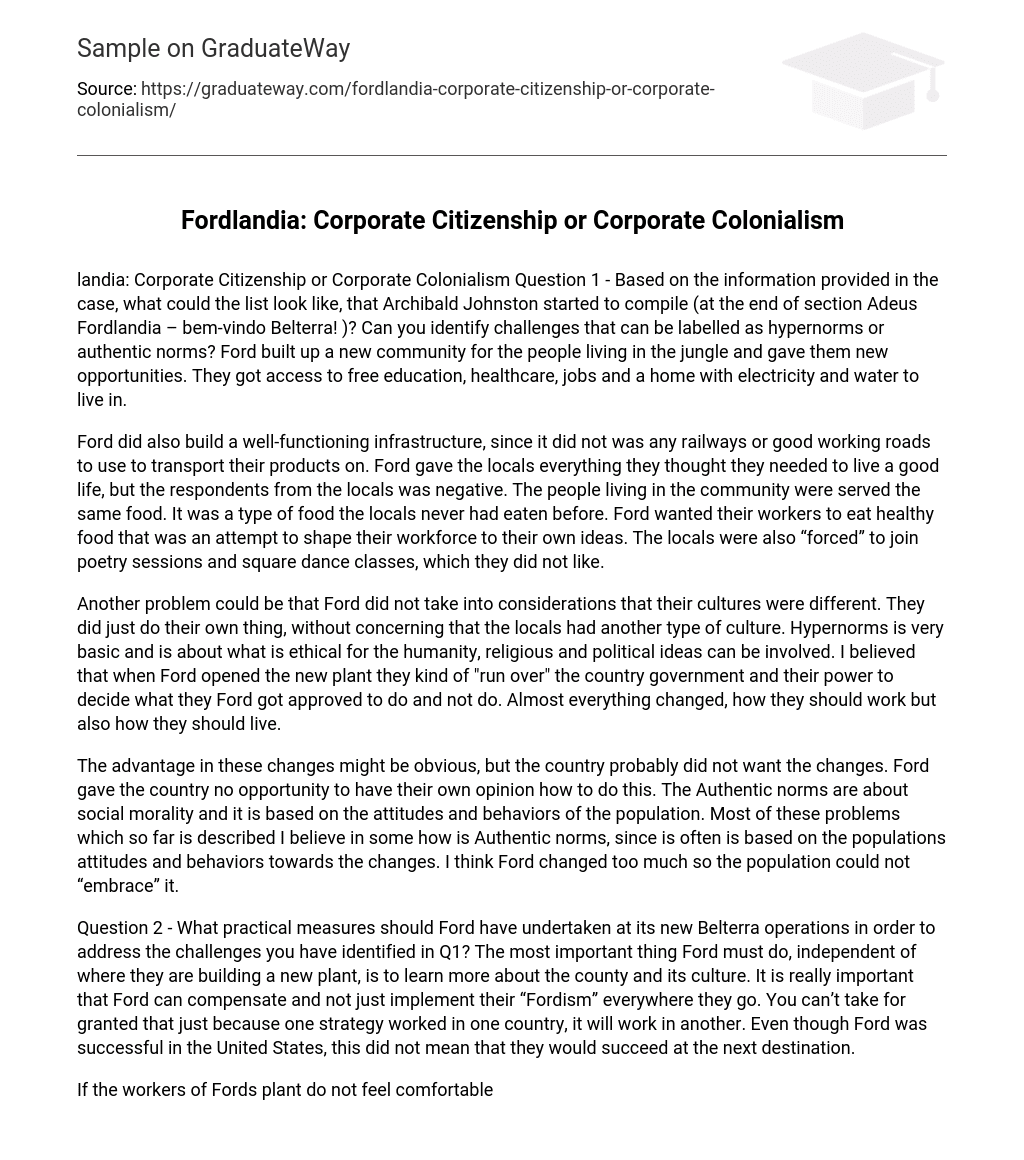landia: Corporate Citizenship or Corporate Colonialism Question 1 – Based on the information provided in the case, what could the list look like, that Archibald Johnston started to compile (at the end of section Adeus Fordlandia – bem-vindo Belterra! )? Can you identify challenges that can be labelled as hypernorms or authentic norms? Ford built up a new community for the people living in the jungle and gave them new opportunities. They got access to free education, healthcare, jobs and a home with electricity and water to live in.
Ford did also build a well-functioning infrastructure, since it did not was any railways or good working roads to use to transport their products on. Ford gave the locals everything they thought they needed to live a good life, but the respondents from the locals was negative. The people living in the community were served the same food. It was a type of food the locals never had eaten before. Ford wanted their workers to eat healthy food that was an attempt to shape their workforce to their own ideas. The locals were also “forced” to join poetry sessions and square dance classes, which they did not like.
Another problem could be that Ford did not take into considerations that their cultures were different. They did just do their own thing, without concerning that the locals had another type of culture. Hypernorms is very basic and is about what is ethical for the humanity, religious and political ideas can be involved. I believed that when Ford opened the new plant they kind of “run over” the country government and their power to decide what they Ford got approved to do and not do. Almost everything changed, how they should work but also how they should live.
The advantage in these changes might be obvious, but the country probably did not want the changes. Ford gave the country no opportunity to have their own opinion how to do this. The Authentic norms are about social morality and it is based on the attitudes and behaviors of the population. Most of these problems which so far is described I believe in some how is Authentic norms, since is often is based on the populations attitudes and behaviors towards the changes. I think Ford changed too much so the population could not “embrace” it.
Question 2 – What practical measures should Ford have undertaken at its new Belterra operations in order to address the challenges you have identified in Q1? The most important thing Ford must do, independent of where they are building a new plant, is to learn more about the county and its culture. It is really important that Ford can compensate and not just implement their “Fordism” everywhere they go. You can’t take for granted that just because one strategy worked in one country, it will work in another. Even though Ford was successful in the United States, this did not mean that they would succeed at the next destination.
If the workers of Fords plant do not feel comfortable in what they are doing and how they are living it will affect their work. So I believe that the main thing Ford needs to do is gain a deeper understand for the people living in the area and their culture, but also their attitude towards Ford and their plats. Question 3 – Please provide modern day examples of the problems Ford encountered at Fordlandia and examine similarities and differences. I think in today’s businesses, there is a deeper understanding of how to adapt to different countries and cultures.
But one example I think could be compared with this is IKEA’s work in Saudi Arabia. This is about how IKEA through Photoshop deleted all women in the catalogs published in Saudi Arabia. This is because women are considered less valuable and may not be seen in these kinds of situations. In this case, I think IKEA adapted too much to the new culture. IKEA is considered as a very Swedish company with a very strong corporate culture and by doing these changes in the catalogue I think they lost their core-idea, to keep the Swedish thoughts.
In Sweden, it became an emotional storm over IKEA’s behavior in Saudi Arabia. By being such a “Swedish” company and behave as a “non-Swedish” company and deleting all the women were not acceptable. The differences between Ford and IKEA are that IKEA adapt to the new culture too much, meanwhile Ford adapt it too little. The similarities between Ford and IKEA is the big differences in the cultures and that both Ford and IKEA loses a piece of their core-values.





